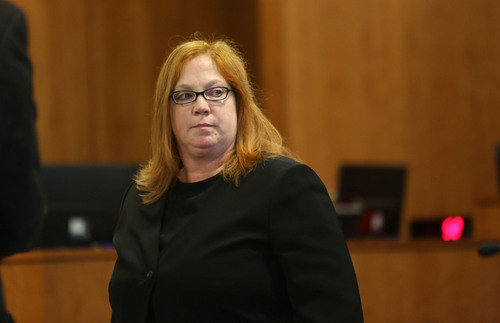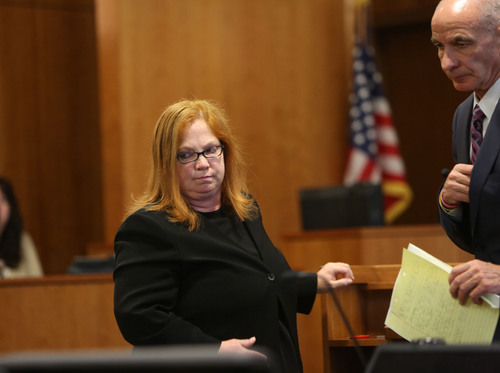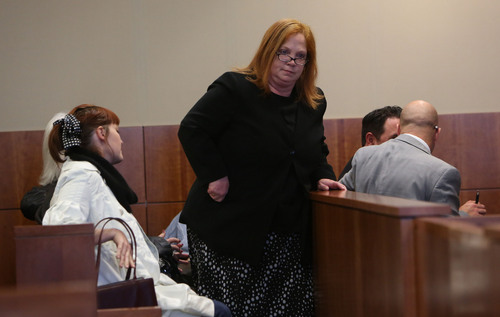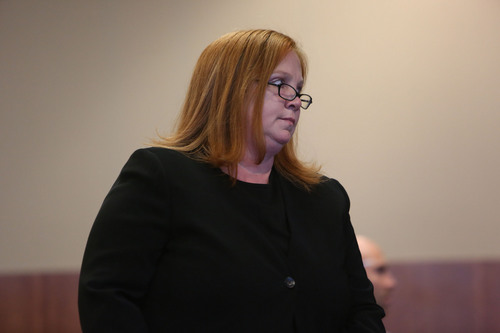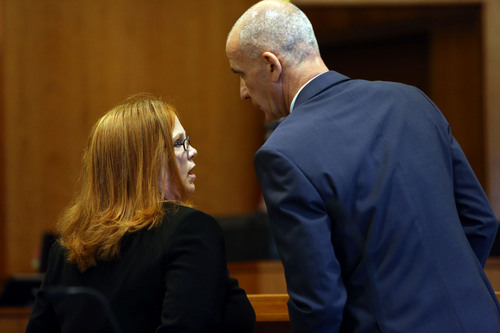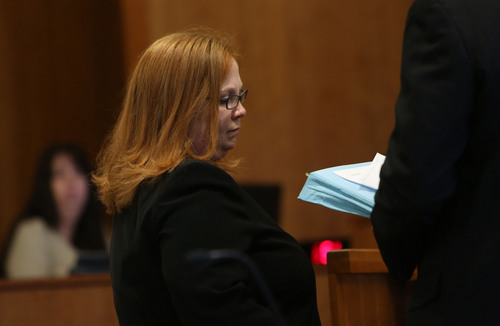This is an archived article that was published on sltrib.com in 2013, and information in the article may be outdated. It is provided only for personal research purposes and may not be reprinted.
Tooele • A hush swept over the courtroom Tuesday as an ex-Salt Lake City judge stood at the lectern, wiped tears from her eyes, and apologized.
She apologized to her friends and family, to her colleagues and fellow judges, to attorneys and defendants from her past, and to those she judged while struggling with an addiction of her own.
"I let a lot of people down, and I'm sorry," former justice court judge Virginia Ward said at her sentencing Tuesday in 3rd District Court. "Obviously, I would like to go back and redo a lot of choices, and undo a lot of carnage, but that's not something that's available to me."
Ward was sentenced to 90 days in jail and three years of very strict probation for picking up packages full of drugs from a post office box in Salt Lake City. She would use the drugs mostly to feed her own addiction to Oxycodone, her attorney explained Tuesday, but would occasionally barter with other addicts or dealers — exchanging different kinds of pills for the Oxycodone she wanted.
"I'm glad to be out of that very dark place. I'm sorry for the damage that I've done," Ward told the court. "I accept your judgment."
Defendants seated in the gallery sucked their teeth and whispered as 3rd District Judge Robert Adkins handed down his sentence.
"Slap on the wrist," one man said.
"I would have gotten the same sentence for a speeding ticket," said another.
She faced up to 15 years in prison when she walked into court Tuesday afternoon.
But Ward's defense attorney, Earl Xaiz, said he felt the sentence was disappointingly harsh.
"I respectfully disagree with the judge's decision here," Xaiz said after the hearing. "I wouldn't say it's fair, but it's not unfair. Had he wanted to make an example out of her, he could have been much harsher."
Adult Probation and Parole, which will oversee Ward's three-year probation, recommended the judge forego jail time and instead sentence Ward to house arrest. Prosecutors were asking that she be given a six-month jail term.
"Mercy should be tempered with maintaining the public trust," said Assist. Utah Attorney General Scott Reed. "You cannot separate the fact that this conduct occurred while she was a sitting and active judge, an active member of the Utah State Bar, a mother of two children."
Ward, 46, pleaded guilty in August to one count of drug possession with the intent to distribute, a second-degree felony.
She was ordered to report to the Salt Lake County jail to begin her incarceration by Nov. 26.
But, so the former judge will not have to serve time alongside prisoners she may have sentenced herself, Salt Lake County will orchestrate a prisoner swap with one of the surrounding county jails — either in Tooele, Summit or Davis Counties.
As part of Ward's three years of supervised probation, she will have to serve community service, continue drug treatment, undergo random drug and alcohol tests — at least one every month — and submit to searches of her home and vehicle.
Before she was arrested, Xaiz said, Ward began to accept that her addiction was unhealthy and unsustainable. Some of the drugs she received in the mail in her last shipment before she was arrested were meant to help her "rehabilitate herself" and ween her off Oxycodone, the lawyer said.
Since her arrest, Ward has completed an in-patient treatment for her addiction and been prescribed anti-depressants that will be monitored closely by her probation officer.
Ward, who has been a judge for Salt Lake City since July 2002 and has tried countless cases against defendants facing misdemeanor drug charges, was placed on administrative leave following her March arrest, and then resigned Aug. 19 in anticipation of pleading guilty.
The ex-judge's legal troubles began earlier this year when she became the subject of a federal investigation by the Drug Enforcement Administration.
According to a probable-cause statement, the DEA was investigating packages believed to contain Oxycodone, a highly addictive and oft-abused prescription drug.
For weeks, DEA agents staked out the UPS Store, 358 S. 700 East, where they believed Ward received her mail. On five different occasions, court documents state, agents witnessed Ward pick up parcels from the store. One time, agents said, she opened the box, pulled out a pill and swallowed it while sitting inside her nearby car.
At the lowest point of her addiction, Xaiz said, Ward was taking far more than the two she was legally prescribed per day.
"Eight a day would have been a low-end estimate, especially towards the end, as her addiction increased," Xaiz said.
Ward was initially prescribed Oxycodone to help manage pain she suffered as a result of a car accident in 1998, Xaiz said after court.
On March 30, the day she was arrested, Ward had received two packages containing 338 tablets of Oxycodone, the documents state.
She told agents that she had been taking the drug to treat her neck pain and also admitted that she had traded "controlled substances that she had received in order to obtain Oxycodone and other controlled substances," the charges allege.
Reed estimated Ward had probably helped bring more than 2,000 pills through the mail in the 170 packages she is believed to have received from various senders from around the country during the first seven months of 2013, including one that arrived six days after Ward's arrest.
The judge said his decision to order Ward to serve less time in jail than the six months requested by prosecutors had much to do with Ward's criminal history, which is nonexistent, and her family circumstance — the former judge is a single mom with two young children, one of whom has special needs.
As she left the courthouse Tuesday, flanked by her attorney and two public defenders who appeared in support of the ex-judge, she declined to comment on the case.
Xaiz, who said he hopes the former judge will be able to piece her life back together in spite of her addiction and the turmoil it has caused. He added that she may, eventually, return to practice law.
"It's a very tough spot," he said. "But there's no reason to believe she won't be able to come back from it."
Twitter: @Marissa_Jae


